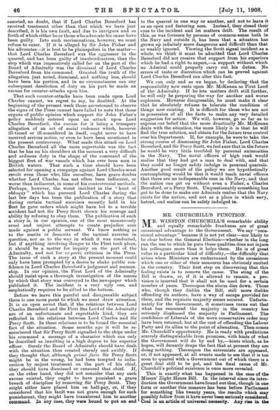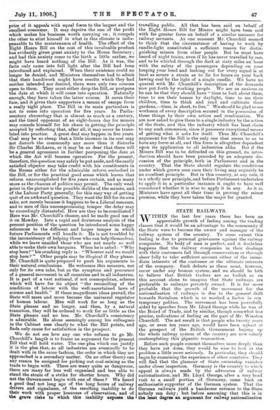MR. CHURCHILL'S FlTNCTION. m it. WINSTON CHURCHILL'S remarkable ability and equally
remarkable frankness are of great occasional advantage to the Government. We say "occa- sional advantage" because it is not yet clear—nor likely to be clear before the General Election—whether in the long run the use to which he puts these qualities does not injure his colleagues more than it helps them. He is of great value in a particular kind of difficulty,—the difficulty that arises when Ministers are embarrassed by the uneasiness which one or other of their measures has obviously exeited in the country. Their first step on discovering that this feeling exists is to remove the cause. The sting of the Bill is drawn, or, if it is allowed to remain, a pro- vision is inserted that it shall not be used for a certain number of years. Thereupon the alarm dies down. Those who, though they dislike the Bill, still more dislike offending its authors, have a. way of escape provided for them, and the requisite majority seems secured. Unfortu- nately for the Government, it sometimes turns out that what has reassured the majority in the country has seriously displeased the majority in Parliament. The confidence of Liberals of the more conservative order may have been retained, but at the cost of offending the Labour Party and. its allies to the point of alienation. Then comes Mr. Churchill's opportunity. He is ready with predictions scarcely distinguishable from promises, with hints of what :the Government will do by and by,—hints which, as he hopes, will decently drape the fact that at present they are doing nothing. Thereupon the extremists are appeased, or, if not appeased, at all events made to see that it is too soon to quarrel with a Government out of which there is a great deal still to be got, and the final cause of Mr. Churchill's political existence is once more revealed.
This is exactly what has happened in the ooze of the Miners' Eight Hours Bill. In the interval since its intro- duction the Government have found out that, though in one form or another this measure has been before Parliament for something like twenty years, the results which may possibly follow from it have never been seriously considered. Coal is an article of universal necessity. Any rise in the price of it appeals with equal force. to the largest and the smallest consumer. It may deprive the one of the profit which makes his business worth carrying on ; it compels the other to stint himself in what in this climate is indis- pensable to the maintenance of health. The effect of the Eight Hours Bill on the cost of this invaluable product has evidently given great anxiety to the Home Secretary ; and had this anxiety come to the birth a little earlier, we might have heard nothing of the Bill. As it was, the facts only came into full light after the Bill had been introduced and explained. When their existence could no longer be denied, and Ministers themselves had to admit that their handiwork might have results which they had. neither intended nor desired, there were only two courses open to them. They must either drop the Bill, or postpone the date at which it will come into operation. Naturally enough, they have taken the latter course. It saves their face, and it gives their supporters a means of escape from a really tight place. The Bill in its main particulars is not to come into operation for five years. In Parlia- mentary chronology that is almost as much as a century, and the timid. opponent of an eight-hours day for miners may console himself for his share in getting the principle accepted by reflecting that, after all, it may never be trans- lated into practice. A great deal may happen in five years. Coal may be so cheap that a. little increase in its cost may not disturb the community any more than it disturbs Sir Charles McLaren, or it may be so dear that there will be a general agreement in further postponing the date at which the Act will become operative. For the present, therefore, the question may safely be put aside, and the easily satisfied objector may take credit with his constituents in the Recess either for the admirable reform embodied in the Bill, or for the practical good sense which leaves that reform unaccomplished for five years certain, and as many more as the chances of politics may permit. The only weak point in the picture is the possible dislike of the miners, and of the Labour Party generally, for this easy way of getting quit of an awkward question. They want the Bill for its own sake, not merely because it happens to be a Liberal measure, and to men of this uncompromising temper the delay may be exceedingly distasteful. How are they to be conciliated ? Here was Mr. Churchill's chance, and he made good use of it on Monday. Into a rapid and dexterous analysis of the present position of the question he introduced some happy references to the different and larger temper in which future Parliaments will handle it. He is not troubled by the inconsistency of helping those who can help themselves, while we leave unaided those who are not nearly so well able to make their own bargains. When he is asked : "Why stop here?" his crushing reply is : "Whoever, said we would stop here ? " Other people may be illogical if they please. Mr. Churchill is quite prepared to push his arguments to their natural conclusions. He welcomes this measure, not only for its own sake, but as the symptom and precursor of a general movement in all countries and in all industries. It is part of a vast national, if not cosmopolitan, scheme which will have for its object " the reconciling of the conditions of labour with the well-ascertained laws of science and health." If these magnificent ideas prevail, the State will more and more become the universal regulator of human labour. Men will work for so long as the State pleases and no longer, and then, by a natural transition, they will be ordered to work for so little as the State pleases and no less. Mr. Churchill's consistency is admirable. He alone seemingly among his colleagues in the Cabinet sees clearly to what the Bill points, and finds only cause for satisfaction in the prospect.
We do not see how any one who refuses to go Mr. Churchill's length is to frame an argument for the present Bill that will hold water. The one plea which can justify it is the plea that, as all industries are eventually to be dealt with in the same fashion, the order in which they are approached is a secondary matter. On no other theory can any reason be assigned for picking out coal-mining as the trade to begin with. There are many quite as dangerous, there are many far less well organised and less able to stand the strain of a strike for shorter hours. Why did not the Government begin with one of these P We heard a good deal not long ago of the long hours of railway drivers and signalmen, of the resulting inability to do their work with proper keenness of observation, and of the grave risks to which this inability exposes the travelling public. All that has been said on behalf of the Eight Hours Bill for Miners might have been said with far greater force on behalf of a similar measure for railway servants. At one moment Mr. Churchill seemed to think that the circumstance of having to work by candle-light constituted a sufficient reason for distin- guishing miners from other people. But he must have heard of night trains, even if he has never travelled by one, and to be whirled through the dark at sixty miles an hour with the safety of the passengers depending on your keeping your head, and looking out for every signal is at least as severe a strain as to lie for hours on your back hewing coal by the light of a single candle. We have no quarrel with Mr. Churchill's description of the demands now put forth by working people. We are as anxious as he can be that they should have "time to look about them, time to see their homes by daylight, time to see their children, time to think and read and cultivate their gardens,--time, in short, to live." We should be glad to see workmen of every description secured in the possession of these things by their own action and combination. We are now asked to give them to a single industry by the action of the State, and this the industry which has least claim to any such concession, since it possesses exceptional means of getting what it asks for itself. Thus Mr. Churchill's argument for the Bill is the only one that seems to us to have any force at all, and this force is altogether dependent upon its application to all industries alike. But if the Miners Bill was to be defended on this ground, its intro- duction should have been preceded by an adequate dis- cussion of the principle, both in Parliament and in the country. That the State should regulate the conditions under which grown men earn their living may arguably be an excellent principle. But in this country, at any rate, it is a wholly new principle, and before Parliament undertakes to apply it in a particular instance it ought to have well considered whether it is wise to apply it in any. As it is, Ministers have spent all their time in proving the minor premiss, while they have taken the major for granted.







































 Previous page
Previous page